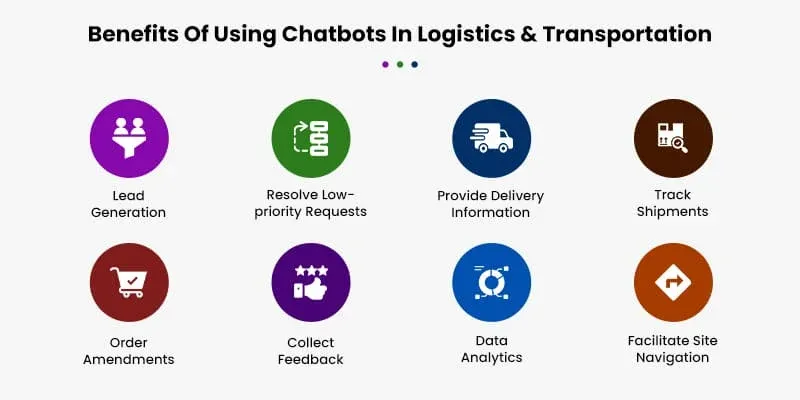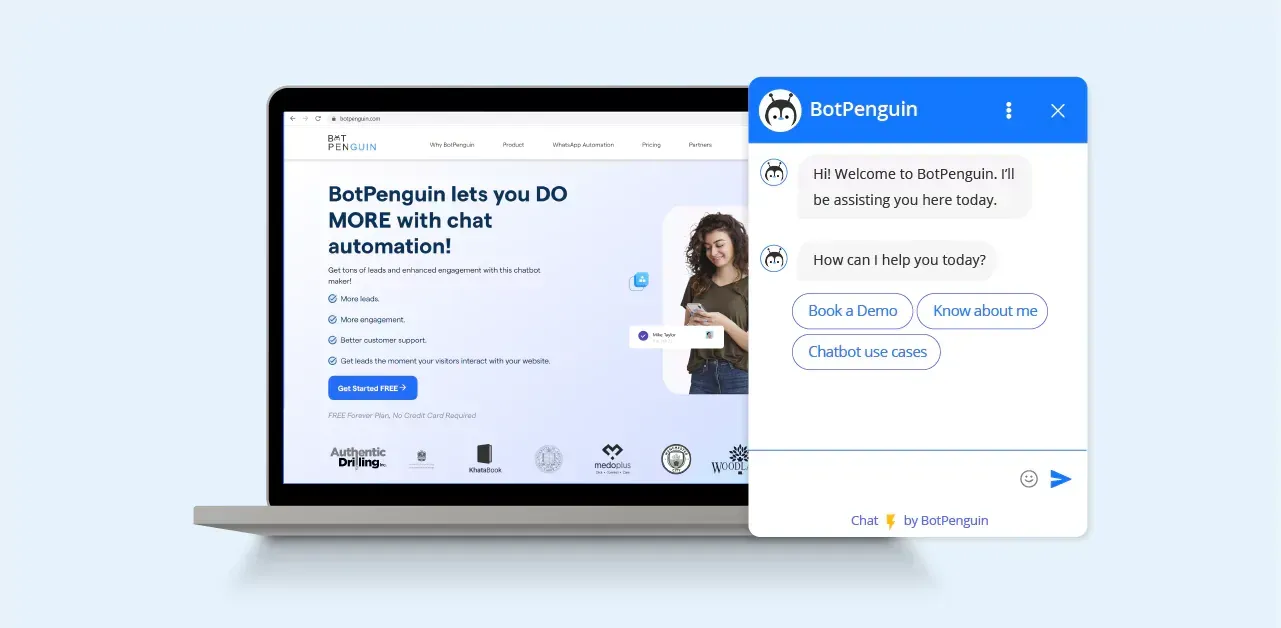You don't have to look far to see chatbots (or AI automation) in everyday life. They assist us in getting directions from one location to another, making purchasing selections on websites, and finding answers to inquiries on our phones.
However, chatbots have more professional and practical applications in the corporate sphere.
Chatbots help with repetitive work, customer service, and assistance, tracking various actions, scheduling events, etc.
They are especially valuable in the logistics and supply chain management industries, where shipping, monitoring, and delivery are critical to success and survival.
Logistics, which includes transportation, storage, and distribution, is the most important aspect of any company's supply-chain management.
Businesses are implementing the most recent customer care technology, chatbots, to streamline operations.
It impacts the future of logistics relations and many other industries by facilitating interactions between customers and businesses.
Chatbots are important in customer-related and supply-chain operations for a logistics organization.
According to a recent study by McKinsey, logistics companies that use chatbots can reduce their customer support costs by up to 25% and increase their sales by up to 15%.
Let’s get into the details.
Custom Chatbots in the Logistics Sector

Custom chatbots are AI-powered virtual assistants designed specifically for the logistics industry.
These chatbots use natural language processing and machine learning algorithms to understand and respond to user queries.
They are programmed to handle various logistics-related tasks and provide real-time information to improve operational efficiency.
How Custom Chatbots Improve Logistics Operations?
Custom chatbots are transforming the logistics industry by addressing the challenges of communication and operations. Let's explore how these chatbots streamline communication and automate repetitive tasks.
Streamlining Communication and Information Flow
Custom chatbots are a centralized communication platform that allows all stakeholders, including customers, suppliers, and carriers, to interact seamlessly.
- Centralized Communication Platform
Instead of dealing with multiple channels, users can simply converse with the chatbot to get instant updates, inquire about shipments, or resolve queries. This centralized approach eliminates communication gaps and ensures everyone is on the same page.
- Real-time Updates and Notifications
With custom chatbots, logistics stakeholders can receive real-time updates and notifications regarding shipments, delays, or delivery status. These chatbots have tracking capabilities and can provide customers and internal teams with up-to-date information. This real-time communication enhances transparency, reduces uncertainty, and improves customer satisfaction.
Automating Repetitive Tasks and Processes
Custom chatbots automate order processing and tracking, reducing manual efforts and improving efficiency.
- Automated Order Processing and Tracking
Customers can place orders through the chatbot, which handles the entire process, from order confirmation to tracking updates. This automation streamlines operations eliminates errors, and saves logistics providers and customers time.
- Intelligent Freight Quoting and Booking
Chatbots with intelligent algorithms can provide instant freight quotes based on shipment details, routes, and other factors. Customers can obtain accurate quotes and even book freight services through the chatbot. By automating the quoting and booking process, these chatbots simplify logistics operations, making it easier and faster for customers to arrange shipments.
Benefits of Custom Chatbots in Logistics
Custom chatbots offer numerous benefits to the logistics industry, enhancing efficiency, improving customer service, and providing valuable insights through data collection and analysis.
Let's explore these benefits in detail.
Enhanced Efficiency and Productivity
Custom chatbots streamline communication, automate tasks, and eliminate manual processes, enhancing efficiency and productivity. Chatbots save logistics providers time and effort by providing real-time updates and notifications and automating order processing.
This increased efficiency allows companies to handle higher orders, reduce costs, and improve overall operational performance.
Improved Customer Service and Support
In the logistics industry, customer service is crucial for retaining clients and gaining a competitive edge. Custom chatbots play a vital role in improving customer service and support.
They offer instant assistance, accurate information, and real-time tracking updates, ensuring customers have a positive experience.
Chatbots can also handle many customer inquiries simultaneously, providing round-the-clock support and reducing wait times.
Data Collection and Analysis for Insights
Custom chatbots can collect and analyze large amounts of data. They can track customer preferences, order patterns, and delivery performance, providing valuable insights for logistics businesses.
This data can identify trends, optimize routes, improve supply chain management, and make informed decisions.
By leveraging data-driven insights, logistics companies can enhance their operations and stay ahead of the competition.
Suggested Reading:
Implementing Custom Chatbots in Logistics Businesses
Implementing custom chatbots requires careful planning and consideration. Here are the key steps involved in integrating chatbots into logistics businesses.
Identifying Business Needs and Use Cases
Before developing a custom chatbot, it's essential to identify the specific needs and use cases within the logistics business.
This can include tasks like order tracking, delivery notifications, and customer support.
By understanding the pain points and requirements, a tailored chatbot solution can be developed to address these challenges effectively.
Choosing the Right Chatbot Development Solution
Numerous chatbot development solutions are available in the market, each offering different features and capabilities.
Choosing the right solution that aligns with the business requirements and budget.
Factors to consider include the chatbot's language processing capabilities, integration options with existing systems, and scalability for future growth.
And finding an option isn't that tough. Meet BotPenguin, the home of chatbot solutions. With all the heavy work of chatbot development already done for you, BotPenguin makes sure that you move forward in your business with the help of smart AI chatbots that can understand and talk like real humans. And all of that is possible on the platform of your choice:

Training and Integration with Existing Systems
Once the chatbot development solution is chosen, training the chatbot to understand and respond to users' queries accurately is important.
Training involves providing the chatbot with a large logistics-related information and scenarios dataset.
Additionally, integrating the chatbot with existing systems, such as inventory management or order tracking, ensures seamless data flow and enhances the chatbot's capabilities.
Custom Chatbot Features for Logistics
Custom chatbots can be equipped with a range of features to meet the specific requirements of the logistics industry.
Here are some key features that can enhance the chatbot's functionality.
Real-time Shipment Tracking and Status Updates
One of the most valuable features of logistics chatbots is the ability to provide real-time shipment tracking and status updates.
Users can simply input their tracking number or order details and instantly receive accurate information on the shipment's location and estimated delivery time.
This feature eliminates the need for customers to make multiple inquiries, reduces customer frustration, and enhances transparency.
Automated Delivery Notifications and Alerts
Custom chatbots can automate the delivery notification process by sending timely alerts and notifications to customers.
These notifications can include updates on the delivery status, estimated arrival time, and any changes or delays.
By keeping customers informed, chatbots improve customer satisfaction and reduce the number of inquiries related to delivery updates.
Intelligent FAQs and Order Tracking Assistance
Chatbots can be programmed with a comprehensive set of frequently asked questions (FAQs) about logistics processes, shipping options, or return policies.
Additionally, chatbots can assist customers in tracking their orders, providing real-time updates, and answering queries related to the order status.
This feature alleviates the burden on customer support teams and enables customers to access information instantly.
Suggested Reading:
Customer Support on WhatsApp: The Future of Customer Service
Addressing Concerns and Limitations of Custom Chatbots in Logistics
While custom chatbots significantly benefit the logistics industry, some concerns and limitations must be addressed.
Let's explore these concerns and discuss how they can be overcome.
Data Security and Privacy
One of the major concerns surrounding chatbot technology is data security and privacy. Protecting sensitive data is crucial as chatbots interact with customers and collect information.
Logistics businesses must implement robust security measures, such as data encryption and secure storage, to safeguard customer information.
Additionally, companies should comply with relevant data protection regulations and establish clear data handling and privacy policies.
Handling Complex Customer Queries
Although chatbots are highly capable, they may encounter difficulties when faced with complex customer queries or unusual situations. In such cases, it's important to balance automation and human intervention.
Custom chatbots can be designed to recognize when a query requires human assistance and seamlessly transfer the conversation to a live agent.
This approach ensures that customer queries are effectively addressed and helps maintain high customer satisfaction.
Balancing Human Intervention with Automation
Another limitation of chatbots is the ability to handle every situation with human intervention.
While chatbots offer efficiency and cost savings, balancing automation and human interaction is essential.
Certain scenarios, such as resolving customer complaints or handling unique requests, may require a human touch.
By integrating chatbots with human support teams, logistics businesses can ensure that customers receive personalized assistance when needed while leveraging automation's benefits.
Suggested Reading:
Challenges in Communication and Operations in Logistics
In the logistics industry, communication occurs across multiple channels, such as emails, phone calls, and instant messaging platforms.
Fragmented Communication Channels
This fragmentation can lead to communication gaps, delays, and misinterpretation of information.
Coordinating between different channels becomes overwhelming, resulting in inefficiencies and errors.
Manual and Time-consuming Processes
Another challenge the logistics sector faces is the reliance on manual and time-consuming processes.
Tasks like order processing, tracking shipments, and freight quoting involve numerous manual steps and are prone to human errors.
These processes consume valuable time and hinder scalability and growth in the industry.
Conclusion
True, AI and chatbots may have some flaws. However, for the most part, these technologies are assisting logistics and supply chain management organizations in streamlining and becoming more efficient.
Updates will bring additional advancements and make AI and chatbots more intelligent as time passes. That means humans can give their AI chatbots more responsibility while dealing with more complex tasks.
And, possibilities are that chatbots may manage and execute all online business transactions currently handled by human employees.
In conclusion, a chatbot is vital in logistics for cost savings, convenience, and simpler processes, and is extremely beneficial to both consumer productivity and supply chain management.
Suggested Reading:
Frequently Asked Questions (FAQs)
How are custom chatbots reshaping the logistics sector?
Custom chatbots are transforming logistics by enhancing efficiency, providing real-time shipment updates, automating order processing, and improving customer service. They streamline communication and offer valuable data insights for better decision-making.
What benefits do custom chatbots bring to the logistics industry?
Custom chatbots improve productivity and reduce costs by automating tasks. They enhance customer service with instant assistance and real-time tracking updates. Additionally, chatbots collect and analyze data for valuable insights, optimizing operations in the logistics sector.
How do custom chatbots handle complex customer queries in logistics?
Custom chatbots strike a balance between automation and human intervention. They recognize when a query requires human assistance and seamlessly transfer the conversation to a live agent, ensuring that complex customer queries are effectively addressed.
Are there any concerns regarding data security and privacy in custom chatbots?
Data security and privacy are important considerations with custom chatbots. Logistics businesses must implement robust security measures, such as data encryption, secure storage, and compliance with data protection regulations, to protect customer information effectively.
What future trends can be expected for custom chatbots in the logistics sector?
Future trends include advancements in natural language processing for more conversational interactions, integration with IoT and blockchain technologies for real-time data access and enhanced transparency, and their potential impact on last-mile delivery and reverse logistics processes.
How can logistics businesses leverage the potential of custom chatbots?
Logistics businesses can embrace custom chatbots by integrating them into their operations. They can automate tasks like order processing, provide real-time tracking updates, and offer personalized customer service, improving efficiency, customer satisfaction, and overall operational performance.


